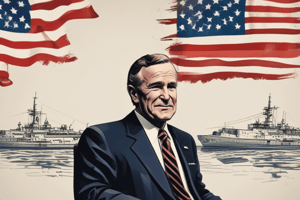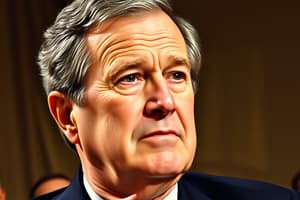Podcast
Questions and Answers
The Cold War ended primarily due to American containment of the ______.
The Cold War ended primarily due to American containment of the ______.
USSR
In 1991, the Soviet Union ______ after years of internal and external pressures.
In 1991, the Soviet Union ______ after years of internal and external pressures.
disintegrated
The Bush administration declared a new world ______ after the end of the Cold War.
The Bush administration declared a new world ______ after the end of the Cold War.
order
The US invasion of Panama in 1989 aimed to arrest President ______ for drug trafficking.
The US invasion of Panama in 1989 aimed to arrest President ______ for drug trafficking.
Signup and view all the answers
Operation Desert Storm was part of the ______ war against Iraq.
Operation Desert Storm was part of the ______ war against Iraq.
Signup and view all the answers
The Clinton administration promoted democracy through strategies of engagement and ______.
The Clinton administration promoted democracy through strategies of engagement and ______.
Signup and view all the answers
The U.S. military intervention in Haiti sought to restore President ______ to power.
The U.S. military intervention in Haiti sought to restore President ______ to power.
Signup and view all the answers
The U.S. led a NATO mission in Kosovo to prevent ethnic ______ against Kosovar Albanians.
The U.S. led a NATO mission in Kosovo to prevent ethnic ______ against Kosovar Albanians.
Signup and view all the answers
The Bush administration adopted a more ______ and unilateralist approach, abandoning treaties like the ABM treaty with Russia.
The Bush administration adopted a more ______ and unilateralist approach, abandoning treaties like the ABM treaty with Russia.
Signup and view all the answers
After 9/11, the U.S. initiated a war against ______ to dismantle al-Qaeda and the Taliban regime.
After 9/11, the U.S. initiated a war against ______ to dismantle al-Qaeda and the Taliban regime.
Signup and view all the answers
The Obama administration focused on ______ diplomacy and cooperation, which was recognized with the 2009 Nobel Prize.
The Obama administration focused on ______ diplomacy and cooperation, which was recognized with the 2009 Nobel Prize.
Signup and view all the answers
In 2015, the United States joined the UNFCCC, a framework for ______ change.
In 2015, the United States joined the UNFCCC, a framework for ______ change.
Signup and view all the answers
The Trump administration implemented an 'America First' foreign policy, leading to ______ relations with Mexico.
The Trump administration implemented an 'America First' foreign policy, leading to ______ relations with Mexico.
Signup and view all the answers
The Biden administration has been characterized by its ______ approach to international relations.
The Biden administration has been characterized by its ______ approach to international relations.
Signup and view all the answers
During the Trump administration, the U.S. withdrew from the Iran nuclear deal in ______.
During the Trump administration, the U.S. withdrew from the Iran nuclear deal in ______.
Signup and view all the answers
Under the Obama administration, Osama bin Laden was killed by ______ SEALs in 2011.
Under the Obama administration, Osama bin Laden was killed by ______ SEALs in 2011.
Signup and view all the answers
Study Notes
Cold War's End
- The Cold War ended due to the overextension of the Soviet Union and the high costs of containment by the US.
- Soviet premier's new approach contributed to the collapse.
- Communist regimes dissolved throughout Eastern Europe in 1989, leading to German reunification in 1990 and the Soviet Union's disintegration in 1991.
Bush Administration (1989-1993)
-
Declared a "new world order" but the Tiananmen Square massacre contrasted this.
-
Led the invasion of Panama (1989) to arrest Manuel Noriega.
-
Responded to the Iraqi invasion of Kuwait (1990) with a multilateral coalition supported by the UN, imposing economic sanctions and creating a large military buildup in the Persian Gulf (30+ states).
-
The Persian Gulf War (Operation Desert Storm) involved aerial bombardment for a month followed by a ground war lasting 100 hours, defeating Iraq. But the administration avoided exceeding the UN mandate for invading Baghdad to remove Saddam Hussein, despite public desire for it.
-
Negotiated arms control agreements reducing nuclear warheads with the USSR.
-
Condemned and supported Gorbachev's return to power during the 1991 coup attempt against him, and later switched support to Yeltsin.
Clinton Administration (1993-2001)
- Emphasized multilateralism alongside engagement and enlargement strategies: promoting democracy, open markets, and Western values.
- Supported a democratic partnership with Russia but criticized the brutality of the Chechen War.
- Collaborated with Russia and Eastern Europe through NATO Partnership for Peace (1994-1999).
- Withdrew troops from UN peacekeeping operations in Somalia.
- Helped restore Haitian President Aristide to power.
- Failed to prevent or end the Rwandan genocide, but assisted in Bosnia, culminating in the Dayton Accord, which ended that war.
- Led NATO intervention in Kosovo to prevent ethnic cleansing of Kosovar Albanians.
- Promoted free trade and mediated peace agreements.
W. Bush Administration (2001-2009)
-
Adopted a more realist and unilateralist approach, abandoning the ABM treaty, rejecting the Kyoto Protocol, and not joining the International Criminal Court.
-
Responded to 9/11 with the war in Afghanistan to dismantle al-Qaeda and the Taliban.
-
Launched the War on Terror (2002), targeting an "axis of evil" (Iran, Iraq, North Korea), invading Iraq (2003) without UN authorization, based on the false premise of weapons of mass destruction.
-
Implemented a new strategy of unilateral and preemptive actions to ensure US security.
-
Created an emergency plan for AIDS relief (15 billions) across the globe.
Obama Administration (2009-2017)
- Returned to multilateralism, emphasizing international diplomacy and cooperation. (2009 Nobel Prize reflection).
- Withdrew troops from Iraq (2011) and Afghanistan.
- Killed Osama bin Laden in 2011.
- Restored diplomatic relations with Cuba, but maintained an embargo.
- Negotiated the Iran nuclear deal, limiting uranium enrichment in exchange for lifting sanctions.
- Joined the UNFCCC (climate change) in 2015.
- Pushed for the Trans-Pacific Partnership, a large trade agreement.
- Negative legacy included drone usage, extensive surveillance, and failed policies during the Arab Spring and Syrian war.
Trump Administration (2017-2021)
- Implemented a unilateralist "America First" foreign policy.
- Relations with Mexico deteriorated due to the border wall.
- Issued an executive order restricting entry from Muslim-majority countries.
- Withdrew from the Trans-Pacific Partnership, Iran nuclear deal, and UNFCCC.
- Faced confrontations and meetings with Kim Jong-un.
- Was impeached twice, but acquitted both times.
Biden Administration (2021-present)
- Embraces a more multilateralist approach.
- Rejoined the Paris Agreement.
- Halted funding for the border wall.
- Reduced drone strikes.
- Withdrew from Afghanistan, leading to the Taliban takeover.
- Supported Ukraine and imposed sanctions on Russia.
- Critical of Israeli practices.
Role of the President
- Constitutionally, the president has the power to sign treaties.
Studying That Suits You
Use AI to generate personalized quizzes and flashcards to suit your learning preferences.
Description
Explore the pivotal events surrounding the end of the Cold War and the actions of the Bush Administration from 1989 to 1993. This quiz covers the dissolution of communist regimes in Eastern Europe, the Gulf War, and the contrasting ideology of a 'new world order'. Test your knowledge of these significant historical changes.




